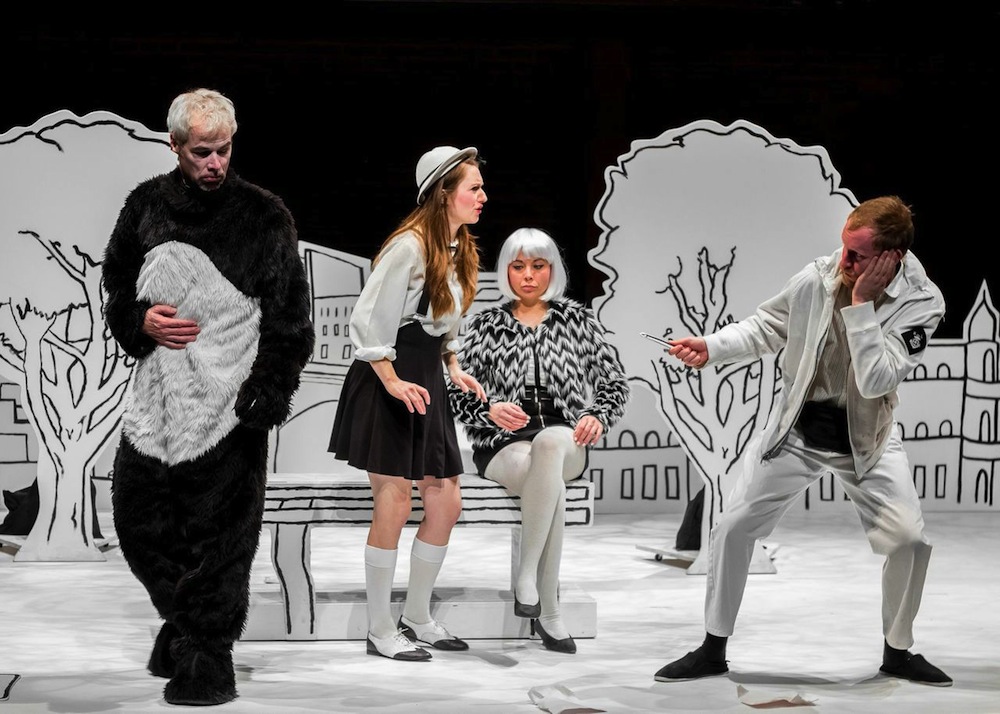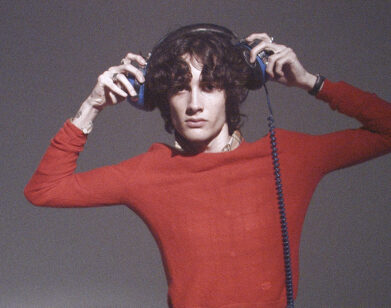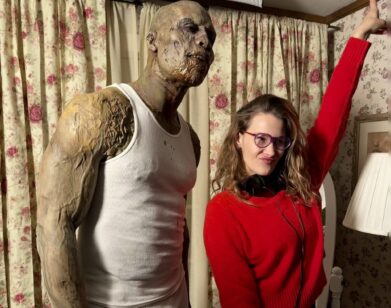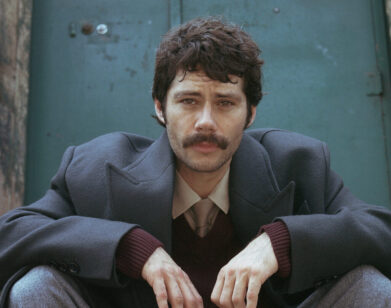Sheila Heti’s Pursuit of Being
It was the completion of How Should a Person Be?, Sheila Heti’s novel about her failure to write a play, that ultimately led to the production of All Our Happy Days Are Stupid. Those who have read How Should a Person Be? will recognize All Our Happy Days Are Stupid as Sheila the protagonist’s “embarrassing, impossible” commission. The history of the real play, which opens tonight at The Kitchen, is not so different from that described in the novel. In 2001, Kelly Thornton, the artistic director of Nightwood Theater, a feminist theater company in Toronto, commissioned Heti to write a piece. “I think I did actually ask, ‘Does it have to be a feminist play?’ and then [Thornton] said no, but you have to have women in it,” Heti explains, referring to a scene that also appears in the novel. Within a few weeks, Heti wrote the play as a musical about two unhappy families on concurrent vacations in Paris. She asked Dan Bejar, of Destroyer and The New Pornographers, to write the music. The following year, the play was put into production, but it was never quite right. “The director had problems with it, the actors had problems with it…I tried to rewrite it during rehearsals. You know, there was really no way of fixing the problem.” Over the next few years, the theater company tried different directors and Heti tried again and again to fix the script, but the play remained in a torturous rut.
Unlike Heti’s character in How Should a Person Be?, the play was not all that Heti was working on at the time. She was completing her first novel, Ticknor, and running a Toronto-based lecture series, Trampoline Hall. Still, Heti says, “[The play] was a side thing that kind of came up that just baffled me, what to do about it.” In 2006, when she began taking notes for what would become How Should a Person Be?, she told the theater company that she wanted to forget about the play altogether. Disappointed, the theater company agreed, and Heti moved forward with her second novel that would be named a best book of the year by The New Yorker, The New York Times Book Review, and The New Republic, among others.
Director Jordan Tannahill contacted Heti after reading How Should a Person Be? and asked if the fictional failed play was real. “I sent him one of the original drafts, and I think he said he was scared by it at first, but then he tried to help me find a director for it, but then later he realized he should be the person to direct it,” Heti says.
With its vibrant setting and exuberant characters, All Our Happy Days Are Stupid is the kind of play that asks its viewer to be reckless and spirited and sporty enough to enter its wild, eccentric world in which a man in a bear suit seduces a failed flautist, a boy goes missing, and a young bride is married to The Prince For All Seasons, all while a carnival marches through the streets of Paris.
HILARY REID: Often when we view art we know there is a backstory to the piece—the history of its creation—but we don’t actually know the full story. Something that seems unique to this play is that people who have read your novel How Should a Person Be? might feel that they have a background and context for the play that you don’t ordinarily have when you view art. How do you think having that context will change the way the audience views the play?
SHEIL HETI: I think it would have to make the experience a little more interesting. I agree with what you say: when you read a book or see a movie, you aren’t constantly thinking about the fact that it was made by humans in time. The artwork is just a fact. It’s kind of like a tree or an orange; it has its own reality apart from the conditions that brought it about. When you’re watching this play, and you know at least the fictional backstory—and also because I’ve been doing interviews, people know the real backstory, as well—I think it would bring you closer to it in some way. Maybe the audience devises a different set of standards by which to judge it, so it’s not only “Do I like this or not?” It’s something else. I’ve been thinking, “What is that other thing?” Maybe it’s just appreciating the fact that, yes, this was made, and it went through all the things you know anything goes through in order to be made. This play is a part of life. It’s not only an aesthetic object apart from life to be contemplated and evaluated. It’s part of the process of life. I’m not actually sure if anybody else will think about it in this way, but that’s how I think about it.
REID: It makes the piece moving in way that goes beyond the action that you’re watching on stage.
HETI: There’s something about this show, because it was cast partially with non-actors from a loose group of friends, where you’re actually closer to the original spirit of making art. You know when kids get together and they just put on a play together? It’s not done so that play will be evaluated in the context of other plays. It’s something that happened because some people just wanted to do it together, detached from ambition, and I feel like this production has a lot more of that spirit than most theatrical productions.
REID: How did you go from thinking the play was a failure to realizing that it was something you wanted to show other people?
HETI: I never would have ever shown it to anybody if Jordan hadn’t asked me. To me the play was really finished, and I was like, “Well, that’s okay. The play turned into this book.” Both How Should a Person Be? and the play are about the unsuccessful navigation of adulthood and the question of how should a person be—they have these sort of thematic similarities—so I was just like, “Well, the play lives through the book.” I wasn’t at all confident about giving Jordan the script. I was open to him reading it because I knew Jordan a bit and liked him. When he said he wanted to do a backyard reading, I thought, “Well, that’s pretty low stakes.” He didn’t say, “I want to put this show on in New York, and I want to put this show on at the Harbourfront Theatre in Toronto.” He just said he wanted to do a reading with some of our friends in the backyard. That just seemed like a fun afternoon. So it just happened step-by-step, and I began to like it. When he said he wanted to do a production of it, I had some trepidation, but also I considered that desire of his—why wouldn’t I let him do it? That’s his project, that’s his artwork. I didn’t feel like this was my project, or that by letting Jordan put it on I was saying, “Well here’s my great play.” I was just letting Jordan do my play. It didn’t imply that I felt one way or another about the script.
REID: How did you translate the fun and freedom of performing the play in the backyard into a theater setting?
HETI: I think a large part of the freedom came from casting a number of non-actors. These aren’t people with preconceived ideas about how a part should be played. They had a very easy relationship to the script in a way that the professional actors from the earlier workshops did not. Those actors kept asking questions about their characters when I thought they should just accept what’s on the page—why not just play it? I felt so frustrated in those workshops, like, “Isn’t the actor’s job just to play what’s there?” But there was all this conversation that I felt so dispirited by.
REID: I would imagine that there’s a certain vulnerability to having your work read back to you, or to having your work performed by other people. Did it feel that way when you heard the backyard reading?
HETI: Oh, I didn’t feel vulnerable. I felt kind of loved. It was a very warm feeling to hear them read it and accept it after the previous actors had read it and utterly not accepted it.
REID: Tell me about the title of the play, All Our Happy Days Are Stupid?
HETI: It just came to me in the middle of writing a scene. I wasn’t sure if it was the title, but I remember I was writing the play at my computer and then jotting it down on a piece of paper beside me: “All our happy days are stupid.” I hadn’t even finished the play, but I liked the phrase, the cadence of it. I didn’t really know what it meant, and I still don’t know what it means, but I feel like it suits the play and it’s the right name for it. I think the play is kind of ridiculous and a little sad, and I think that’s what that phrase gets across.
REID: It made me think about how How Should a Person Be? couldn’t have been titled How Should a Person Be Happy? It wasn’t about finding happiness; it was about figuring out how to be, which seem different.
HETI: Yeah, and ‘all our happy days are stupid’ kind of seems like there’s no real solution. Because if what you want are happy days, but they’re going to be stupid…there’s no out. [laughs] There’s no sophisticated happiness. Happiness comes about by accident and from stupid things. I’m not sure exactly. I just I like the way it sounded, frankly.
REID: In your interview with Joan Didion for The Believer, Didion said that for her, writing always seems to have an element of performance. Do you feel that way?
HETI: Yeah, probably. There is always a sense somewhere in your mind that it will be read. As soon as a witness comes into your mind, on some level you’re doing it for the witness. Or you’re before them, at the very least. You’re appearing before someone, doing something.
REID: And in the case of All Our Happy Days Are Stupid, you can actually sit with the people witnessing your play, whereas with your books you can’t experience the story with the reader.
HETI: Yeah, and it’s much more exciting, obviously. [laughs] When someone’s reading my books I have no experience of that. Unless they tell me about it, or tell the internet about it. When they did the first production of the play at Videofag, I went to every single performance—well, there was one I couldn’t go to—but I just really enjoyed being with the audience. I enjoyed not necessarily the experience of my own play, but I liked being part of the audience, and I loved what the actors did. Being in an audience and having something happen on a stage and having it only happen once and it then being lost to history—I love that. You really only get that with theater.
REID: Are the stakes higher knowing that each performance only happens once?
HETI: Yeah, the stakes are higher and they’re also less high because, in the case of the first Videofag show, 30 people each night witnessed it and that’s high stakes for the 30 people in the room, but low stakes for the world at large. Knowing it is going to disappear into the ether… For me, it’s not even about stakes. It’s just about the beauty of something disappearing. I love that it disappears, and that even though we’re remounting the show, the Videofag production will never happen again.
REID: Do you think there are other forms of art that are capable of disappearing in that way?
HETI: Yes, but not as completely of theater. You might read a book and then forget about the book, but the book still exists. The theater piece is really gone. Not to say that if you read a book a second time, your first experience of reading it won’t disappear. Every time you read a certain book it’s a new book, because you’re a different person, you’ve had experiences since the last time you read it, you’ve been in more rooms. When you read a book a second time, you might imagine a room you were in last week, which would not be the room you would have imagined when you read the book two years ago, because you were not in that room yet. I think Jordan said this in an interview, which I thought was great: when a play fails, it’s so awful for the audience because you’re there in real time with the performers, and you’re sort of implicated in the failure. You’re in the room. That’s why it’s so awful to see a bad play—it’s happening to all of you together in that moment.
REID: Right, there’s this camaraderie in watching an awful play that’s different from looking at a bad painting with five other people.
HETI: [laughs] Right.
REID: Have you ever done any acting?
HETI: Yeah, I acted when I was a kid, like I was in Barbie commercials and little parts on TV shows. That was what I wanted to be when I was 12 years old, an actress.
REID: Would you return to it?
HETI: I don’t think so. I mean, I did experimental theater with this company DNA in Toronto from age 15 to my early twenties. The director, Hillar Liitoja, was the most respected experimental theater director in the city, and when I quit his company, I remember having a conversation with him where I said, “I want to write, I don’t want to act.” That was the end of acting for me. Also, I never thought I was very good at it—I kind of knew that in my bones. Margaux [Williamson] asked me to be in her movie Teenager Hamlet, and I was in it, but it wasn’t exactly acting, it was more like playing myself.
REID: How does creating a character on stage differ from creating a character on the page for you?
HETI: In some ways, when you’re writing in the first person, like with How Should a Person Be?, you are acting, but you’re acting in your—maybe this is true for an actress, too, I don’t know if it is—but you’re sort of acting in your whole life. So the whole five years that I was writing How Should a Person Be? I was sort of acting this Sheila that I was writing about, but I didn’t even notice or know exactly that I was doing it. Whereas, that kind of strange, confusing magic never happened when I was acting as a straight actress. I was just myself, completely untransformed.
REID: You said once that gossip was a big part of art. Can you tell me more about that?
HETI: A book is a person talking to you about people—that’s what a novel is—it’s like Tolstoy’s talking to you about Anna Karenina and Vronsky. When we talk to our friends about “She broke up with him,” or “They’re having a baby,” or “They’re having troubles in their relationship,”—why do we love to do that? It feels so bad afterwards, you feel like you’re such a gross person, and why are you using your friends in this salacious way? I think that novels are the non-gross way of talking about people and thinking about people and getting whatever pleasure we get from hearing about how other people’s lives unfold. I think that’s a really deep need and curiosity and pleasure.
ALL OUR HAPPY DAYS ARE STUPID OPENS TONIGHT, FEBRUARY 19, AT THE KITCHEN IN NEW YORK.







